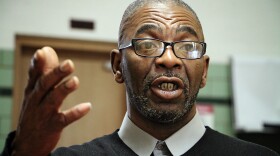There’s now a financial rescue plan for Detroit public schools. But the district's problems go way beyond money: Test scores are among the worst in the nation; students are leaving; teachers are leaving.
Last week we brought you stories about the DPS crisis from the students' perspective. This week on State of Opportunity and Stateside, we're talking to teachers to get their take on the work that needs to happen to get DPS back on track.
Josh Andrew teaches English at Cody Medicine and Community Health, a high school on Detroit's west side where they've taught for the last two years. He's a white, 24-year old Teach for America corps member. "All the wrong answers for teaching in Detroit," jokes Andrew.
Maybe. But the reality is, inner city school districts across the country, including Detroit, rely heavily on young, white teachers like Andrew to step into classrooms and teach kids who are mostly black and living in poverty.
And like so many TFA teachers before him, he's leaving.
I spent quite a bit of time at Cody MCH two years ago, when Andrew was just starting out at Cody and finishing up his master's in education at the University of Michigan. I was mostly following freshmen at the time, so I often sat in on Andrew's ninth grade English class, where I could see up close the care and concern he had for his students.
It's not a stretch to say he's considered one of the best teachers at Cody. In two years' time, he helped his tenth grade students jump five grade levels in reading, from an "average [of] about the second grade level" up to around a seventh grade reading level. Not bad for someone who -- up until that year -- had never stepped foot inside a high school; he was home-schooled until he went away to college.
Keep in mind though, even with his help, these are 10th graders reading at a middle school level. Andrew says there’s so much more that needs to be done to address the achievement gap.
"We need to, like, as a district, take a step back and say: 'What are the most concerning things facing our schools right now?' Attendance. Let’s figure out attendance."
Attendance is a major problem in Detroit, and it’s one Interim Superintendent Alycia Meriweather is aware of and is working to address. More than 50% of Detroit students are chronically absent from school. The national average is 13%. In a written statement to Michigan Radio, Meriweather says the district is "working with the national chronic absenteeism experts at Attendance Works, academic and positive behavior support experts at the State of Michigan and the National Technical Center for Positive Behavioral and Intervention Support" to solve the problem.
"Teachers can’t do the work in their classroom when kids aren’t there," says teacher Josh Andrew. "And then when you have a million kids not there, teachers start to feel defeated, and when teachers feel defeated, everything else breaks down."
But the problems don't end there. Andrew says things at Cody were chaotic this year. Students wandered the halls and skipped class without any real consequences. The high school’s theme is medicine and community health, and yet two out of the five science teachers were long-term subs. And when it came to rules, it was kind of a free-for-all:
"How long has Cody been around and we, like, don’t have a cell phone policy that we follow through on? Or a tardy policy, or an attendance policy? I know that’s a problem across Detroit, but all these little things that we should be doing and following through on that we just don’t."
A district spokesperson says DPS does have cell phone policies and the like in place, but acknowledges schools could do more to enforce those policies.
Beyond those housekeeping issues, Josh Andrew says the district needs a "strategic vision" for how to educate its kids. And he says that vision has to become a reality in the classroom.
"You want to work in a place where you feel like people are on the same page, where people have an idea of like, ok, this is where we’re going together, this is what we’re doing and this is how we’re going to accomplish it," he explains. "Where people have that at every level: Teachers have it, administrators have it, superintendents have it. And that doesn’t seem to happen here right now."
You can hear the awe and, frankly, exhaustion in his voice when he marvels at the fact that he's only been dealing with this for two years, whereas more veteran teachers at Cody and the district at large have been dealing with the chaos for 20, 30 years. "Imagine doing it for three decades," he says. "That's overwhelming to think about." He says the teachers who have stuck with DPS and show up for their students every day are "an incredible example."
"I'm not gonna show up next year," says Andrew, and "my voice is compromised because of that. My integrity is compromised." He’s moving to Atlanta to teach. He has the ability to leave and start over. Most of his students don’t.
Listen to Stateside today at 3 pm and 10 pm to hear a veteran DPS teacher share her thoughts on the district and what can be done to improve it.





